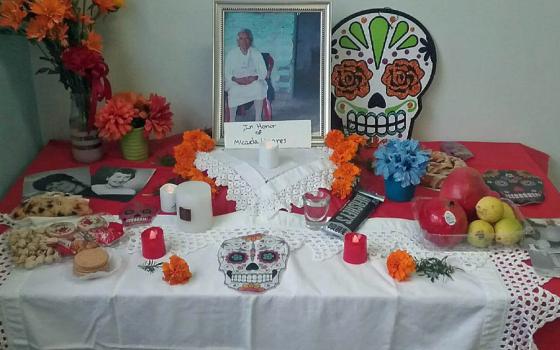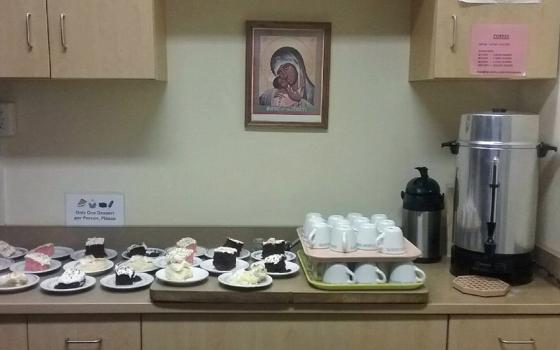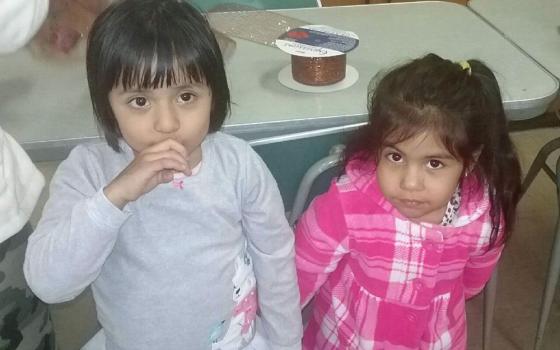Notes from the Field includes reports from young people volunteering in ministries of Catholic sisters. A partnership with Catholic Volunteer Network, the project began in the summer of 2015. This is our sixth round of bloggers: Natalia Liviero is a volunteer with VIDES+USA serving in the Middle East, and Janie Rosko is a Humility of Mary volunteer serving within the Ursuline Ministries in Youngstown, Ohio.
______
On Oct. 31, we celebrated Día de los Muertos at our Immigrant Outreach Program at Beatitude House on the west side of Youngstown.
Día de los Muertos, or Day of the Dead, is an annual day to remember those who have passed away that is celebrated in various Latin American countries as well as other places such as New Orleans. Typically, Day of the Dead is practiced Nov. 2, but sometimes it can be Oct. 31 through Nov. 2. Because of everyone's schedule, we decided to celebrate Oct. 31.
Before the main festivities, Judy, a volunteer, instructed the women of our program on how to make decorative wreaths. Crafting allowed the women to strengthen their relationships with one another and practice their English skills. Incorporating hands-on activities is essential for learning, even for adults. This is especially true when it comes to activities they find interesting and meaningful, such as this craft.
After decorating wreaths, a student named Iris read a written piece I found online called "Oración por un difunto" ("Prayer for a deceased person"). It is about peace and fulfillment being given to a loved one who has passed away. It is a tool for us to ask for the people mourning a loved one to be granted wisdom and strength to get through such a difficult time. These ideas are associated with Día de los Muertos.
Volunteers celebrated with families in the Immigrant Outreach Program from Mexico, Guatemala, El Salvador, Honduras, Peru, China, Palestine, and those who are American citizens from Puerto Rico. We enjoyed the abundance of food — pupusas, spring rolls, salad, pico de gallo, fruit salad, hot chocolate, cupcakes, rice and cabbage, vegetarian chili and cheese rolls — and discussed this tradition, among others. We spoke about the recipes we used for our own contributions but also which new dishes we tried and liked.
Samantha, another Humility of Mary AmeriCorps member, and I put together an altar to show appreciation for the dead; however, later in the week it was suggested that a student from Mexico, Lidia, set up an altar in place of ours. We meant well when we put ours together, but Lidia had a deeper understanding and appreciation for this tradition. Volunteers and other students could gain a better sense of knowledge about this practice through Lidia's altar because she could give us more insight about why she displayed the different items. Some of us added photographs of loved ones who passed away. There were also candles, flowers, chocolate, a mango, a pomegranate, guavas and pistachios on the altar as gifts for those loved ones.
Iris, who is from El Salvador, said it was customary for people in her country to have the day off work and to celebrate with food and flowers inside of cemeteries after repainting or renovating them. Yvonne, a volunteer, said her father's family celebrated in a similar way in New Orleans. There, it is a French and Catholic tradition where people celebrate all day long at the cemetery with food and family. People enjoy picnics in the general location where members of their family were buried.
Although I have never participated in a cemetery celebration for Day of the Dead, I aspire to. The celebrations I experienced at Beatitude House touched me deeply, especially given the recent passing of a wonderful person I met at the Dorothy Day House in Youngstown.
I have been cleaning dishes and preparing and serving food on Tuesday evenings at the Dorothy Day House since October 2016. There are Dorothy Day Houses sprinkled throughout the United States; here, people, typically those who are low-income and/or homeless, are served a hot meal and sometimes are given the opportunity to have a warm shower.
A middle-aged man named Ed had been receiving assistance from this particular Dorothy Day House since around the time they first started serving food on Dec. 9, 2009. I found this out recently. However, I have known Ed since I first began helping out.
Ed recently passed away, so some other volunteers put together a beautiful ceremony for him on Oct. 30, and I was fortunate enough to attend. At the ceremony, similar to the concepts behind Día de los Muertos, his life was remembered and celebrated. Everyone came to the consensus that he was a highly intelligent individual who was always intently listening and observing. He knew the Bible inside and out, was a huge fan of sports, and loved playing chess. These were some pieces of Ed.
I had conversations here and there with Ed while he was alive. I would always greet him warmly, just as I try to with everyone at Dorothy Day House. Though he was soft-spoken, people easily noticed Ed's raw sense of wisdom. But even if he were none of these things, Ed was a person, and that alone is enough for us to celebrate his life.
Everyone who comes to be served at Dorothy Day House is a person. Everyone served at Immigrant Outreach is a person. Everyone who helps at these places is a person. Sometimes, we fail to fully acknowledge the humanity in each other, and we must do better.
This is an important component as to why I serve. Regardless of class, language, skin color, religion or sexual orientation, everyone is a person who deserves love and a recognition of their life once passed.
Death is powerful, but so is life. Throughout my time serving these two incredible ministries, among others, I have learned innumerable lessons. I especially appreciate genuinely listening to other people, understanding where they are coming from, and finding a way to celebrate with them. It can be like celebrating Day of the Dead, but we must, most importantly, celebrate and care for each other while we are here on Earth.
[Janie Rosko is a Humility of Mary volunteer serving within the Ursuline ministries in Youngstown, Ohio.]




